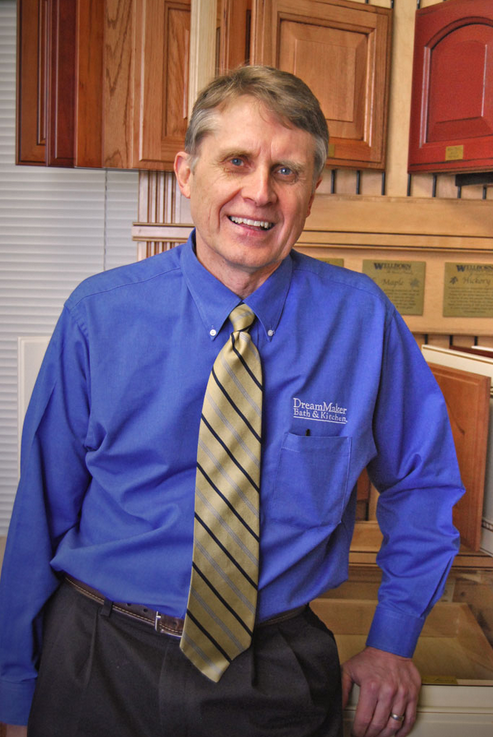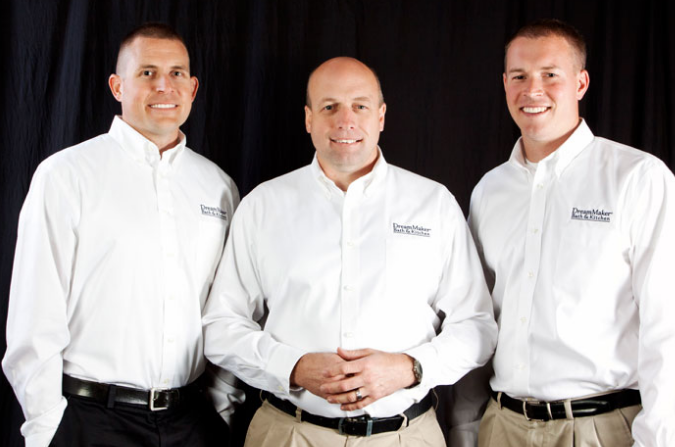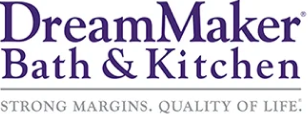“They lead using Biblical principles, and believe that people are more important than profits,” says Steve Coombs of the DreamMaker remodeling franchise in Ogden, UT.
 Steve Coombs
Steve Coombs
Steve Coombs, who co-owns DreamMaker Bath & Kitchen of Ogden in Ogden, UT, had already built a strong architectural business before deciding to give DreamMaker a call. His firm, Habitations Residential Design Group, opened in 1999 and designed 3,000- to 25,000-square-foot luxury homes in resort communities like Park City, Utah, before the recession hit. Fortunately, Steve had already started working with DreamMaker in 2004. He partnered with a friend from church, Brad Stevens, to start their DreamMaker Bath & Kitchen franchise, which was featured by Remodeling Magazine on its 2013 Big 50 remodelers list.
Steve recently shared his story with us:
What were you doing before DreamMaker?
I started in 1999 my own architecture company. I’m an engineer, and I worked in aerospace for a number of years, then became an environmental engineer for an oil company and moved into management. I eventually got tired of corporate politics and decided to go out on my own. In 1999, I started Habitations Residential Design Group. We still operate that business in conjunction with DreamMaker. I had been interested in architecture from the time I was a kid. My father tinkered around with home planning and design, and that’s what I studied for a while in college before switching to engineering. What I love about custom homes is the same thing I love about kitchens and baths — you get to be creative.
Your firm was already doing great business before the recession. What attracted you to DreamMaker?
We have always been very customer-focused in our design business and believed in a lot of the same things that DreamMaker does in terms of customer service and having a firm Code of Values. Over the years, a lot of our customers have had such a good experience with us in the design process for their new homes that when we got to the jobsite, they asked us to stay involved and to handle some of the construction. We had done some construction management, but they wanted us engaged in some of the actual construction work. We referred clients to people we knew and trusted, but those requests planted the idea that maybe we could generate more revenue. DreamMaker looked like a synergistic opportunity for us.
We were also attracted to the kind of people they are, their focus on customers, their focus on doing things the right way, treating people with respect, and building a viable business based on Biblical principles. Initially, we were just looking for an opportunity to offer construction services on the remodeling side. After we became involved, we really liked the focus on Christian values in a business environment and thought there were some things that would really help our architecture business, too.
How have the DreamMaker systems helped?
The structured approach to marketing is one good example — how to really manage and record and evaluate leads in order to evaluate the effectiveness of the marketing and adjust budgets. Initially, DreamMaker was promoting several sources of lead generation, one of which was direct marketing, which we had never thought about much with Habitations. Most of our advertising was in periodicals and at home shows, and DreamMaker showed us how to target marketing to certain areas that have the best potential prospects, identifying areas that are primed for remodeling, and that helped us pick up additional leads.
The budgeting and planning process DreamMaker offers helped us fine-tune our other business and think more strategically to develop a long-term growth plan. I knew a lot of that stuff from my time in corporate America, but when you own a smaller company and you have fewer people to assign tasks to, some of that planning goes by the wayside. DreamMaker’s systems help us stay on top of it and keep an eye on all the pieces so that we’re working on the business, not just in the business.
Did you pick up any tips from other franchise owners?
We have learned from franchisees that every market has some issues you have to pay attention to. For instance, our market tends to be very conservative, and we have a lot of do-it yourselfers. Families are pretty tight-knit, and if you don’t know how to do something in the house, it’s pretty common to have a cousin or a nephew who does and is happy to do the work for you at a low rate. We’ve had to change our marketing a bit so that it doesn’t offend do-it-yourselfers but explains some of the reasons you might not want to do it yourself. (laughs)
We have a nice resource here — my daughter, Katie Sadler, works part-time for us. She owns her own marketing company, Sadler Creative, and has created a lot of great materials for us, sometimes tweaking the materials provided by corporate.
That’s great! Tell us a little about your family.
I have six children who are all married — four boys and two girls, and we are up to 14 grandchildren. My wife’s name is Annette, and we’ve been married 41 years.
 Steve and Brad’s team at DreamMaker Bath & Kitchen of Ogden, UT.
Steve and Brad’s team at DreamMaker Bath & Kitchen of Ogden, UT.
What sets DreamMaker apart?
One thing is our branding: “Enhancing Lives, Improving Homes.” We have been very consistent in the way we brand ourselves, and people see our marketing messages. We use quality images in our materials, so people can see the work we have done, and we have earned a lot of national recognition — CotY (Contractor of the Year) Awards, Big 50 awards, things that we have earned through the corporate recognition program.
The other thing is our sales system. DreamMaker ascribes to a Seven Step Sales Philosophy that has helped us build rapport and trust with people right up front. As you start to understand personality differences and how to read a customer’s personality so you can communicate with them effectively and tailor the design process to them, you’re able to give customers a better experience.
We also have a Design Center, which is part of the DreamMaker business model, where people can look and see samples of products. That lets people see we are not a typical remodeler. We have invested in the Design Center to allow you to touch and get a feel for a variety of products.
What qualities should a good DreamMaker franchisee have?
Faith and patience. If you are going to be leader of a company, you have to be aggressive, assertive, goal-oriented, focused on priorities and objectives, and motivated financially — but as important as those qualities are, there are always going to be bumps in the road, some of your own making, some because that’s just the way it is. There are going to be downturns in markets that you can’t control. The Great Recession is a great example. Being patient and having faith — having the optimism that if you hang in there, do your best and live the principles you believe in, and engage in the things that are needed on a regular basis, you will be okay. Having inner peace and spiritual strength makes a difference.
What are some of the most gratifying jobs you do?
There are a lot of people whose lives we have improved through better design. We qualified to become a Veterans Administration contractor, working on VA accessibility issues for injured veterans. The VA has a program that provides grants to help people who suffered disabilities through their service, to provide them the means to make homes accessible and more useful for them, which is especially a problem in bathrooms and kitchens. We recently finished a project for a veteran couple, one of whom was disabled, and she needed some changes in her home so she could use it more effectively and safely. They were in a three-bedroom house, and we took out one bedroom and used that space to expand one bathroom and then also create a master bathroom with a walk-in tub, a roll-in shower, and accessibility features. They also had a beautiful backyard, so we reconstructed their decks and installed a lift that allowed them to get to grade level without looking obtrusive. At end of the project, we had an open house. We have gotten two other clients out of that job — friends of theirs who also have accessibility issues.
Accessibility is important for older clients, too, and they often need kitchens rearranged to make them easier to use.
What do you appreciate most about the leadership and support staff at DreamMaker?
They lead using Biblical principles and believe that people are more important than profits. That goes for how they want customers to be treated and employees as well as suppliers. Doug (Dwyer, DreamMaker’s president) is the initiator of that — he pioneers that philosophy. He doesn’t try to push specific beliefs on anyone — I’m Mormon, and I love DreamMaker — it’s just good, solid Christian principles of how people should treat one another.
How important is previous remodeling experience?
The systems give anyone an opportunity to take hold and have success. You need to be interested in the business — it’s home improvement stuff, and I have an interest. You should have a passion for creating. There are so many ways you can design a kitchen. It baffles people sometimes when they come into a Design Center and they don’t realize there are that many types of countertop materials, cabinet door styles, wood species, finishes. It’s great to see the level of enthusiasm your customers express when they see all the opportunities that are there. It is an exciting place to be part of that process. Definitely, a little bit of knowledge of construction helps — knowing what the industry is like, what it takes to do the work, to schedule the work, to deal with subcontractors and all that goes with that. The more experience you have in that, the more confident you’ll feel in starting the franchise. But the systems are set up so that anyone could succeed if they surround themselves with people who have the skills.
How has DreamMaker fit in with Habitations, your other business?
DreamMaker’s model is targeted at mid- to high-middle income remodeling jobs, and Habitations is mostly high-end, so there isn’t a whole lot of overlap. As far as revenue, DreamMaker is larger than the architectural company. It produces greater financial rewards for us than Habitations does.
How has the peer networking benefited you?
We spend a lot of time with other franchisees at the annual reunion, building relationships and talking about what we are doing, how our sales numbers compare, and sharing ideas and strategies. We feel comfortable with anybody, and that’s a very positive thing.
Would you recommend a DreamMaker franchise to someone else?
Yes, certainly. It’s a good business, and gives you the tools to succeed and the support you need. DreamMaker is a good model. I would recommend them. We’ve actually tried to open some other territories in southern Utah by partnering with other people. It’s been a good franchise for us.
Learn more about DreamMaker
DreamMaker Bath & Kitchen helps franchise partners stand out by offering savvy, proven marketing plans and tools, excellent systems for operating your business, and a wealth of support to help you grow. To learn more about the remodeling industry, and why we are excited about the growth potential for our franchisees, visit our research pages. To learn even more, fill out a form to download our free franchise report and start a conversation. We look forward to talking with you!


